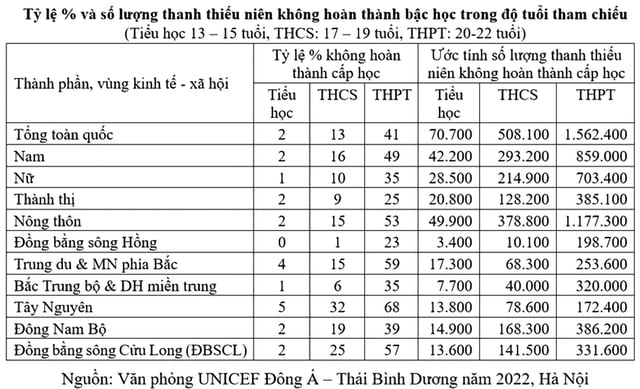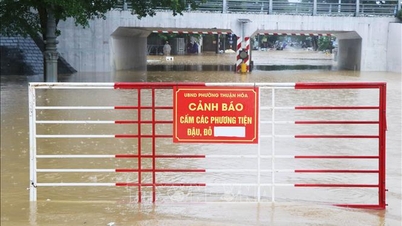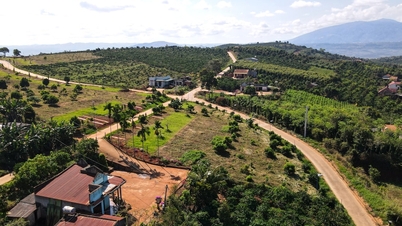Compulsory education for 9 years has been defined in Resolution No. 29-NQ/TW. However, up to the time of this amendment to the Education Law, the policy still stops at primary level.
C. OPEN POLICY BUT THE LAW STILL "STANDS STILL"
Compulsory education (GDBB) is the foundation for building a learning and sustainable development society. Resolution No. 29-NQ/TW dated November 4, 2013 on fundamental and comprehensive innovation in education and training affirms the goal: "Improving the quality of universal education (PCGD), implementing GDBB for 9 years after 2020". Conclusion No. 91-KL/TW dated August 12, 2024 of the Politburo continues to affirm "implementing GDBB for 9 years". This is the minimum level of education that citizens need to have to participate in labor, vocational training, high school, and access basic skills in modern society.

Compulsory education of 9 years, ending at junior high school, is an urgent requirement.
PHOTO: NGOC DUONG
However, after much debate, the 2019 Education Law only regulates universal primary education. Specifically, Article 14 of this law stipulates: Primary education is universal primary education. The State implements universal preschool education for 5-year-old children and universal secondary education. The State is responsible for implementing universal primary education nationwide, deciding on plans, and ensuring conditions for implementing universal primary education.
According to the draft amendment to the Education Law that is being consulted by the Ministry of Education and Training, Article 14 still affirms: Primary education is universal education. The State implements universal preschool education for children aged 3-5 and universal secondary education. The State is responsible for implementing universal education nationwide, deciding on plans, and ensuring conditions for implementing universal education. The Government shall specify this in detail.
Thus, compared to the current law, this draft only expands the scope of PCGD preschool education from 3 to 5 years old, to ensure that most Vietnamese children attend kindergarten. At the same time, the Government will issue a decree regulating PCGD and GDBB.
However, the fact that GDBB is still "standing still" is contrary to the policy and has not kept up with the general trend of the world that has implemented GDBB for 9-12 years.
IMPORTANT RESULTS OF UNIVERSAL EDUCATION
It is worth noting that, over the past two decades, Vietnam has achieved many outstanding achievements in universal primary and secondary education. According to data published by the General Statistics Office in 2024, the average number of years of schooling in Vietnam increased from 9 to 9.6 years in the period 2019 - 2024, helping Vietnam complete universal primary education and approach universal secondary education. The average primary school attendance rate is 98.7% - this is a high threshold and has remained almost unchanged over the years. This rate in secondary education is 95.6% and in high school is 79.9%.
The school system has been expanded to communes, villages and hamlets, creating favorable conditions for students in remote areas to go to school conveniently. The rate of students dropping out of school is decreasing. This is a remarkable result, showing the strong commitment of the State in realizing children's right to education.
However, once universalization has reached a certain threshold, the next requirement is to ensure that all children complete at least nine years of education, that is, complete lower secondary school.
CONSEQUENCES OF NOT IMPLEMENTING 9-YEAR COMPULSORY EDUCATION
Vietnam has not yet implemented 9-year compulsory education for a number of reasons. First of all, the legal barriers from the 2013 Constitution and the current Education Law only stipulate primary education as compulsory education, making it difficult to force citizens to complete grade 9.
Next, educational conditions are not uniform. In remote areas and ethnic minority areas, facilities and teaching staff are still not enough to ensure that all children receive 9 years of education. The cost of accommodation, transportation, books and other support is still a burden for many poor families. Awareness of the importance of education to the end of secondary school in some mountainous areas and ethnic minority areas is still limited, many families let their children work early to support the family or there are cases of early marriage.

In addition, the lack of a strong enough legal corridor along with limited monitoring and handling measures for violations also makes the implementation of the GDBB policy difficult.
The failure to implement the 9-year GDBB has caused many worrying consequences. The 2022 summary report on the education situation in Vietnam by the UNICEF East Asia and Pacific Office analyzed the learning and equity aspects of Vietnamese children and women, showing that 70,700 children aged 13-15 have not completed primary school, 508,100 young people aged 17-19 have not completed lower secondary school, and 1,562,400 young people aged 20-22 have not completed upper secondary school.
Some localities have a high rate of youth who have not completed secondary school, such as the Central Highlands (32%), the Mekong Delta (25%), and the Southeast (19%). Citizens who do not complete secondary school will have difficulty accessing vocational education, employment opportunities, and personal development, affecting the sustainable development of the country. A segment of the youth with low education is at risk of leading to social evils.
If this situation continues, it will disrupt the sustainable development efforts that Vietnam is pursuing, and reduce the quality of human resources - which is a key factor in the period of innovation, digital transformation and international integration.
9-year compulsory education is not only a correct policy but also an urgent requirement. A country cannot develop sustainably if its citizens lack basic education. Therefore, despite many difficulties, it is time for us to have a political and legal commitment and a strong education policy to implement the equivalent of 9-year compulsory education. Once the Constitution is amended, we will officially implement 9-year compulsory education like many countries in the world.
Vietnam has the ability to implement GDBB for 9 years
First of all, the Party and the State have been implementing many policies to exempt and reduce tuition fees and support learning for students nationwide. On February 28, 2025, the Politburo decided to exempt tuition fees for all public preschool and primary school students and support tuition fees for non-public students nationwide from the 2025-2026 school year. Tuition exemption will be fully legalized to avoid financial pressure that causes children to drop out of school.
Next, the educational system has been increasingly expanded, many localities have completed the network of schools down to the commune level, even the village level; the number and quality of teachers have been improved. The quality and effectiveness of the innovation of the general education program have been increasingly affirmed.
These are ripe conditions for applying 9-year compulsory education. According to education experts, in the absence of amending the Constitution, it is still possible to implement administrative and policy measures to implement commitments equivalent to 9-year compulsory education. When drafting sub-law documents such as decrees and circulars, it is entirely possible to stipulate the responsibilities of parents, guardians and the community in ensuring that children complete grade 9.
In addition, there should be a specific monitoring mechanism for local authorities (wards, communes, special zones) when there is a high dropout rate. Along with that, State and local policies should encourage students to study after primary school.
The media needs to get involved strongly, turning completing junior high school into a social norm, not just a personal obligation; moving towards businesses not accepting workers who have not completed junior high school.
Source: https://thanhnien.vn/giao-duc-bat-buoc-9-nam-vi-sao-khong-nen-cham-tre-185250522215741927.htm


![[Photo] President Luong Cuong receives US Secretary of War Pete Hegseth](https://vphoto.vietnam.vn/thumb/1200x675/vietnam/resource/IMAGE/2025/11/02/1762089839868_ndo_br_1-jpg.webp)

![[Photo] Lam Dong: Images of damage after a suspected lake burst in Tuy Phong](https://vphoto.vietnam.vn/thumb/1200x675/vietnam/resource/IMAGE/2025/11/02/1762078736805_8e7f5424f473782d2162-5118-jpg.webp)



![[Video] Expected many special policies on salaries and allowances for teachers](https://vphoto.vietnam.vn/thumb/402x226/vietnam/resource/IMAGE/2025/11/02/1762099443374_luong-dac-thu-cho-giao-vien-3221-jpg.webp)





























































































Comment (0)